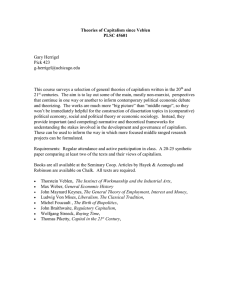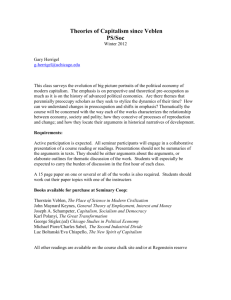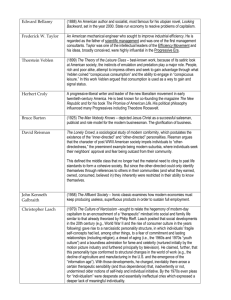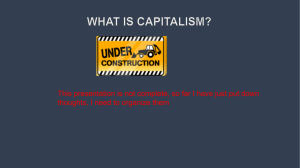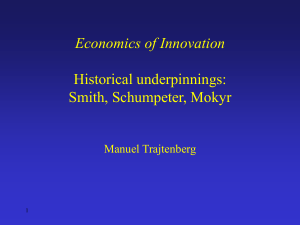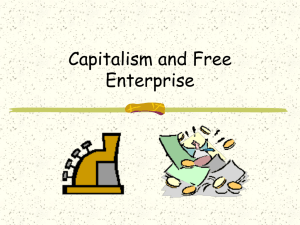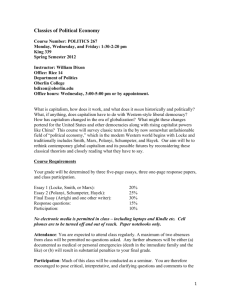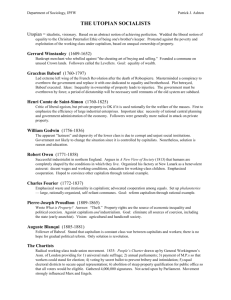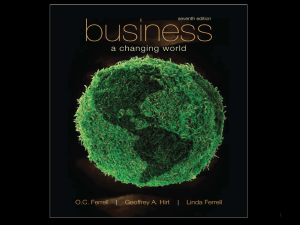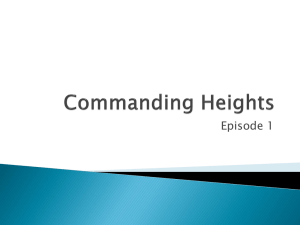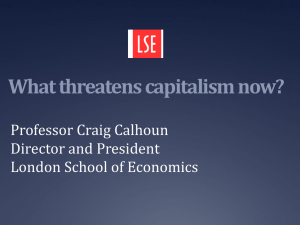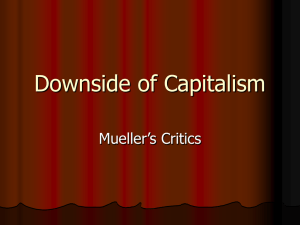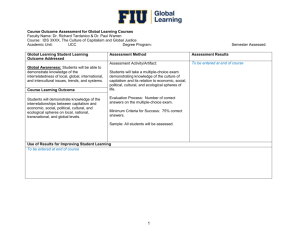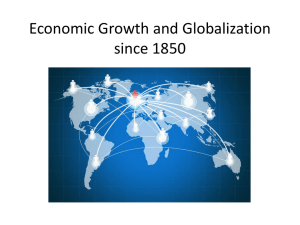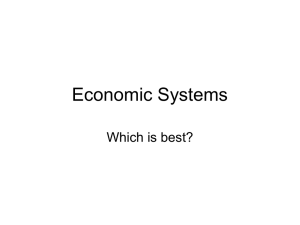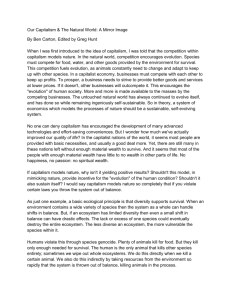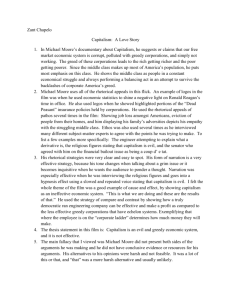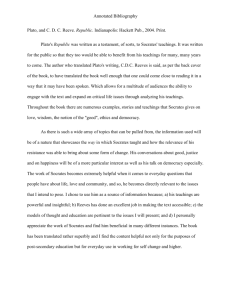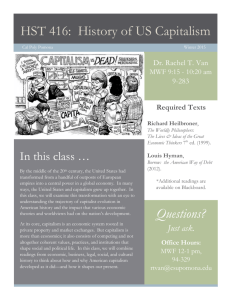Theories of Capitalism since Veblen
advertisement
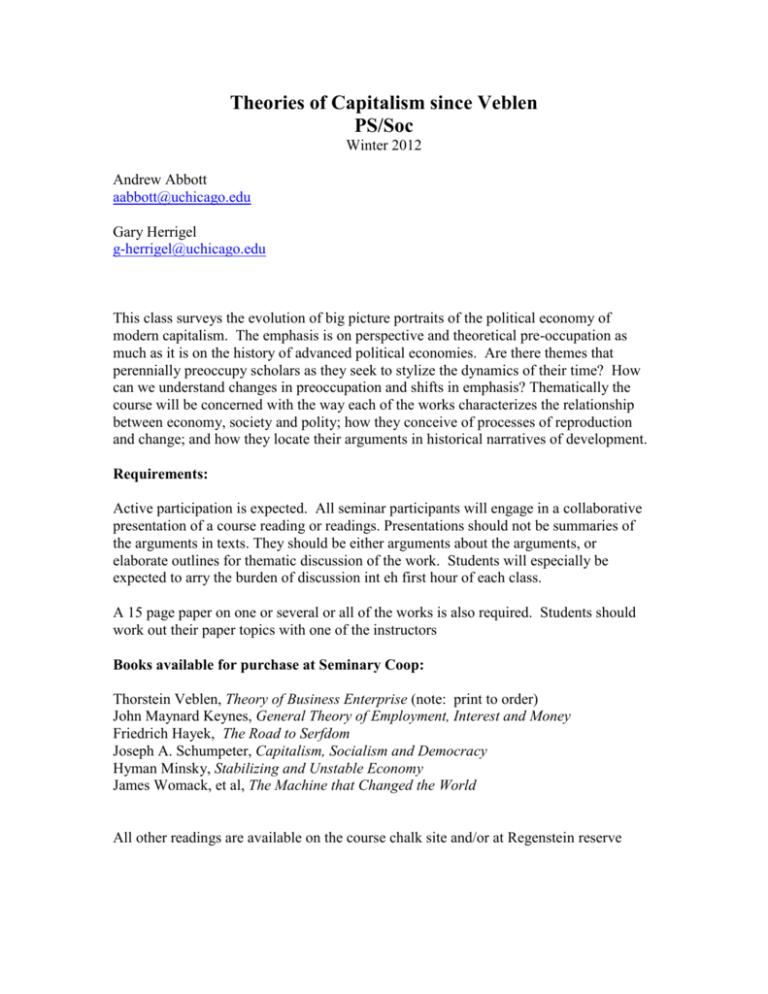
Theories of Capitalism since Veblen PS/Soc Winter 2012 Andrew Abbott aabbott@uchicago.edu Gary Herrigel g-herrigel@uchicago.edu This class surveys the evolution of big picture portraits of the political economy of modern capitalism. The emphasis is on perspective and theoretical pre-occupation as much as it is on the history of advanced political economies. Are there themes that perennially preoccupy scholars as they seek to stylize the dynamics of their time? How can we understand changes in preoccupation and shifts in emphasis? Thematically the course will be concerned with the way each of the works characterizes the relationship between economy, society and polity; how they conceive of processes of reproduction and change; and how they locate their arguments in historical narratives of development. Requirements: Active participation is expected. All seminar participants will engage in a collaborative presentation of a course reading or readings. Presentations should not be summaries of the arguments in texts. They should be either arguments about the arguments, or elaborate outlines for thematic discussion of the work. Students will especially be expected to arry the burden of discussion int eh first hour of each class. A 15 page paper on one or several or all of the works is also required. Students should work out their paper topics with one of the instructors Books available for purchase at Seminary Coop: Thorstein Veblen, Theory of Business Enterprise (note: print to order) John Maynard Keynes, General Theory of Employment, Interest and Money Friedrich Hayek, The Road to Serfdom Joseph A. Schumpeter, Capitalism, Socialism and Democracy Hyman Minsky, Stabilizing and Unstable Economy James Womack, et al, The Machine that Changed the World All other readings are available on the course chalk site and/or at Regenstein reserve Week 1 Thorstein Veblen, Theory of Business Enterprise Mary Parker Follett, “Community is a process”. The Philosophical Review (1919) vol. 28 (6) pp. 576-588 Week 2 John Maynard Keynes, The General Theory of Employment, Interest and Money Week 3 Joseph Schumpeter, Capitalism, Socialism & Democracy Week 4 Friedrich Hayek, The Road to Serfdom Recommended: Hayek, “Economics and Knowledge”, “The Use of Knowledge in Society” “The Meaning of Competition” all in idem., Individualism and Economic Order Week 5 Paul Baran & Paul Sweezy, Monopoly Capital Week 6 Andrew Shonfield, Modern Capitalism: The Changing Balance Between Public and Private Power p 3-176; 221-238; 298-357; 385-427 Alfred Chandler, Managerial Hierarchies (Introduction/ The United States) p 140 Week 7 Hyman P. Minsky, Stabilizing an Unstable Economy, Chs 1, 4-10 James P. Womack, Daniel T. Jones, Daniel Roos, The Machine that Changed the World Chapters 1-6 Week 8: George A. Akerlof, “Behavioral Macroeconomics and Macroeconomic Behavior,” American Economic Review, 92 (3), June 2002, pages 411-433; Joseph E. Stiglitz, “Information and the Change in the Paradigm in Economics,” American Economic Review, 92 (3), June 2002, pages 460-501; Paul Romer, “The Origins of Endogenous Growth” Journal of Economic Perspectives, 8 (1), 3-22; Gregory Mankiw, “A Quick Refresher Course in Macroeconomics,” Journal of Economic Literature, 28 (4) Week 9 Ragurham Rajan & Luigi Zingales, The influence of the financial revolution on the nature of firms, AER, 2001 vol. 91 (2) pp. 206-211 Charles Sabel, A Real Time Revolution in Routines, in Heckscher & Adler, eds., The Corporation as a Collaborative Community (Oxford 2005) Gerald Davis, “The Rise and Fall of Finance and the End of the Society of Organizations”, Academy of Management Perspectives, 2009 pp. 1-18 Wolfgang Streeck, “The Crises of Democratic Capitalism” in New Left Review 71, Sept-Oct 2011, pp 5-29
